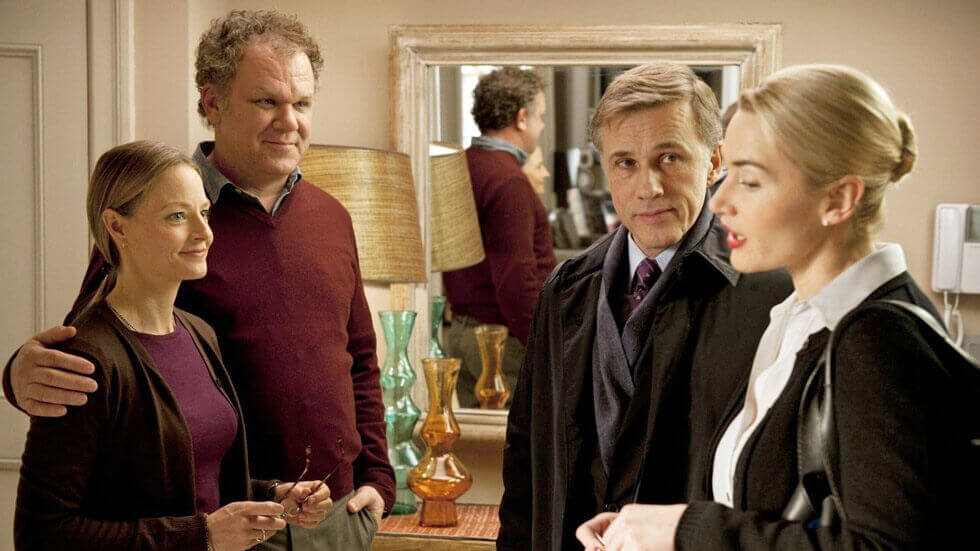Without leaving the room and with only four actors, we witness a magnificent ridiculousness of everyday life. God of Carnage is a Roman Polanski film, which in turn is an adaptation of Yasmina Reza’s play The God of Carnage.
Undoubtedly the cast of the film is exceptional: Kate Winslet, Jodie Foster, Christoph Waltz and John C. Reilly are the four actors, the only ones in the film. It is a short film, static in terms of spaces, limited in characters, but with a very powerful scenario. The full weight of the film is in the performance and script of the actors.
“The origin of the law, as you know, is brute force. -Alan Cowan, God of Carnage-
It all starts after the discussion of two kids in a park, the only outdoor stage you can see. The fight ends when one hits the other with a stick. Then we headed to the home of Longstreet, the family of the boy who was beaten. and, as a result, he had problems in his mouth. The parents of the two children gather in the apartment mentioned to try to find a solution to the problem.
Throughout the film, the characters unmasked and went from political correctness to aggression, even Michael, who looked like a peacemaker, will show a dark and evil side, the conversation will become a real verbal carnage, where the knives will fly as much as possible. What would initially be the resolution of a conflict and an example for your children becomes a real jungle, where everyone sees its true nature.
Arguments and coherence disappear, aggressiveness sets the tone, characters completely lose their roles and enter the worst of their versions. The seemingly serious situation will become an absurd argument and close to puerility.
In Deus da Carnage the most primitive impulses of the human being are explored, its visceral and darker side is revealed, all in an almost claustrophobic space, because every attempt by Cowan to leave the apartment will be thwarted as he enters a new discussion.
Discussions sometimes create a cycle, plunge us into a dead end from which it is difficult to get out of it and, when it seems that everything is going to be resolved, another dispute will hinder us and force us to conflict. seem to resolve conflicts in the film, caught between the four walls of a room that won’t get them anywhere. As they approach the elevator, when it looks like it’s over, they start a new discussion and find themselves trapped in the living room.
The conflicts are so widespread that what began as a war between two families eventually turned into a struggle between women and men and eventually led to a completely individualistic war. Each of them defends himself; Human stubbornness will be extreme, everyone wants to be right and everyone thinks that if the world were like them, it would be much better.
Carnage God presents a caricature of human nature, we see characters who use countless defense mechanisms, very primary and very basic, who lose their role and have no problem stabbing others.
Each of them has built an image of himself that he wants to project, and when he weakens, they fall into aggression because they cannot let his ego feel attacked.
As we leave social conventions, as we show your true character, we see the reality behind the mask, we see hypocrisy and lack of morality in our world. Polanski gives a pessimistic air to our daily lives, because the characters are not strangers to us and it is easy to identify with some of them or identify people from our environment.
The money and importance of status will be criticized in the film, particularly through Alan Cowan’s character, who is more interested in his work than in his own personal relationships; He is barely interested in his son’s education and we see him as an immoral figure when we discover that his job is to defend a pharmaceutical company whose drugs cause serious health problems, and he is still stuck on his mobile phone to solve work problems. , allowing you to escape the discussion at all times and it will be an additional trigger for the conflict by preventing communication between the two families.
Penelope will be the character who contrasts the most with Alan, because she seems very focused on humanitarian causes and very aware of the problems of the third world; however, she has not left the cave and believes everything she sees.
Is the overprotection that occurs in many cases against children, preventing them from resolving conflicts by themselves, blaming excessively on some and victimizing others? When, in reality, there are many nuances. The importance of material in our society is also questioned, like the vomiting scene in art books or the destruction of mobile phones.
This chaotic and meaningless situation ultimately leads to nothing. Better yet, it will be the children who will finally teach their parents a lesson through a short scene. In the park where it all started, they seem to have left their differences. Think and rethink that maybe we get too complicated in life and that everything can be reduced to a simple discussion between children who end up shaken hands.
Criticism, comedy and realism go hand in hand in this film that presents us with a very everyday situation, which goes beyond false smiles and shows the human being as a caged animal that, when it breaks the bars, is nothing more than a violent and selfish. God of Carnage is a work of art that shapes our current society, a film whose human stupidity is one of the keys.
“I believe in the god of carnage, a god whose rules have not been questioned since time immemorial?Alan Cowan, god of carnage?”

